
Compilation Album
The Hollyridge Strings "The Beatles Song Book Vol.2" (CP-7238)
(Update: 21th. October 2020)



| TITLE | THE BEATLES SONG
BOOK VOL.2 The Hollyridge Strings |
||||
| CATALOG NUMBER | CP-7238 |
||||
| RELEASE DATE | 15th July 1965 / First Press | ||||
| TRACK LISTING | SIDE 1 | SIDE 2 | |||
| A Hard Day's Night |
I Feel Fine | ||||
| Things We Said Today |
No Reply |
||||
| She's A Woman |
I'll Be Back |
||||
| If I Fell |
I'm A Loser |
||||
| I'll Cry Instead |
I'll Follow The Sun | ||||
| I'm Happy Just To
Dance With You |
|||||
| FRONT --> Click! | BACK --> Click! | SIDE 1 --> Click! | SIDE 2 --> Click! | DISK | |
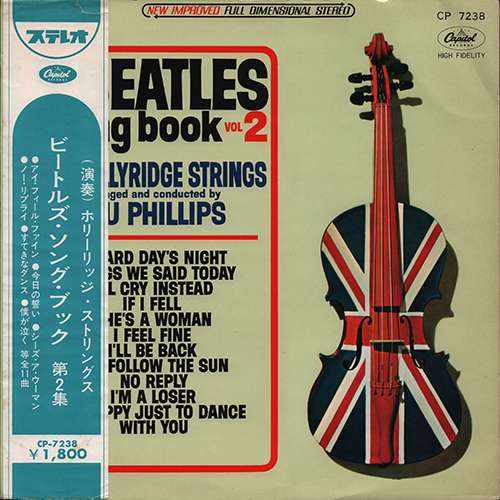 |
 |
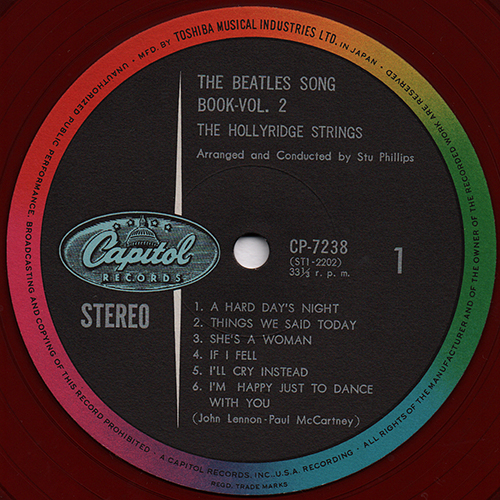 |
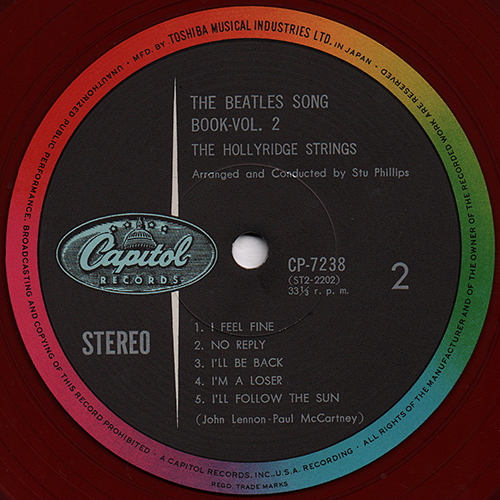 |
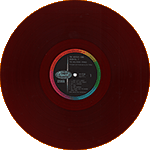 |
|
| INSIDE --> Click! | INNER SLEEVE | ||||
| FRONT --> Click! | BACK --> Click! | The original colour "advert" inner bag has a fold-over flap at the top of the bag to prevent the record from falling out. | |||
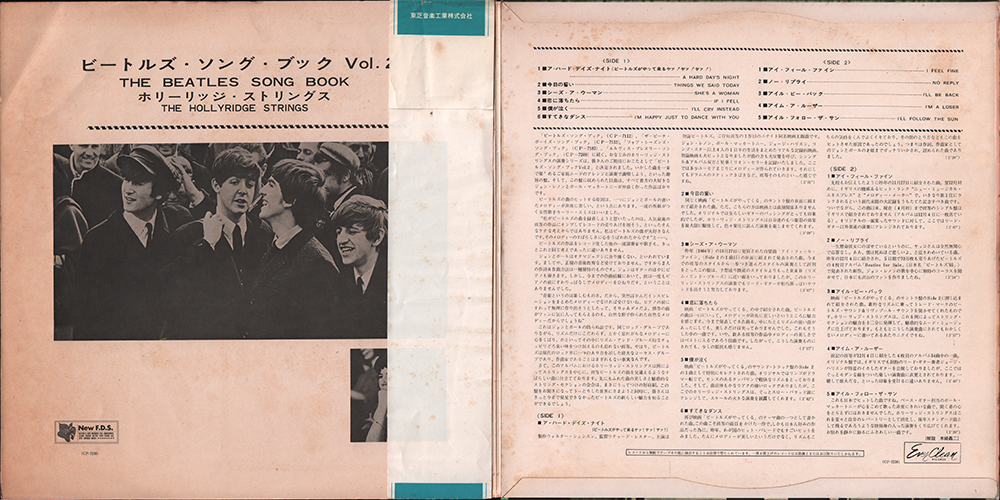 |
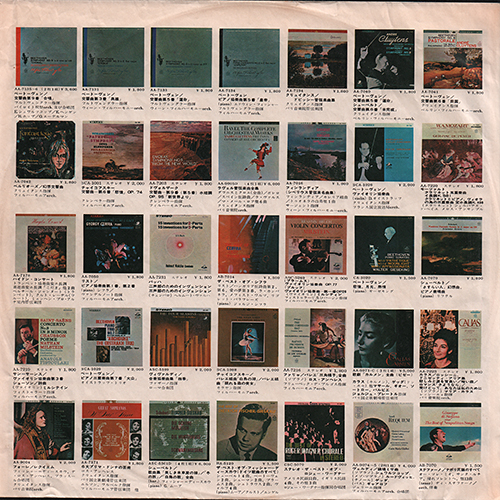 |
 |
|||
| INNER SLEEVE CLOSE UP | FRONT COVER CLOSE UP | ||||
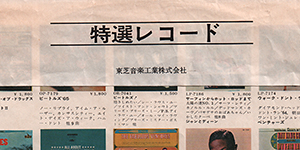 |
The words "Special Selection Records" was printed in black. |
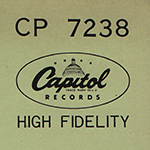 |
Catalogue number "CP 7238", Capitol logo mark, and the word "HIGH FIDELITY"were printed at the upper right corner of the front cover. | ||
| FRONT COVER CLOSE UP | |||||
 |
The front cover slicks has the "Capitol Full Demensional Stereo" arrow logo at the top. | ||||
| BACK COVER CLOSE UP | |||||
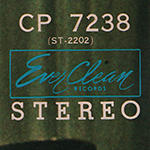 |
 |
||||
| Catalogue number "CP 7238",
EverClean logo mark, and the word "STEREO"were
printed at the upper right corner of the front cover. "Toshiba Musical Industries Ltd." and "G ¥1,800" were printed at the bottom of the back cover. |
|||||
| BACK COVER CLOSE UP | |||||
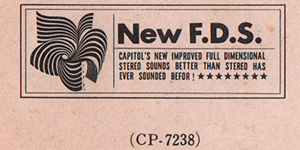 |
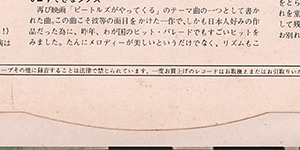 |
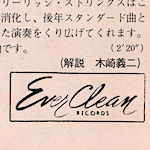 |
|||
| Capitol's
"New improved fukk dimentional stereo sound" logo was
printed at the inside of the cover. |
Gatefold type. Full laminated soft cover. flipback cover. | Toshiba pressed a lot of their records on red, “Everclean” records. | |||
| Light
Blue OBI CLOSE UP |
|||||
| FRONT: TOP |
FRONT: BOTTOM |
1st. pressing had a light blue / white OBI and priced ¥1,800 on obi strip. Capitol logo mark and catalog number "CP-7238" were printed on the front. | BACK | ||
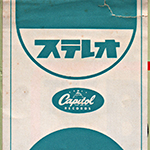 |
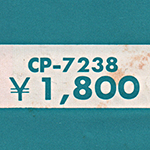 |
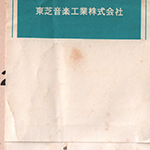 |
There is no order sheet on the back side of the
Obi. "Toshiba Musical Industries Ltd." was printed on the strip. |
||
| LABEL CLOSE UP | |||||
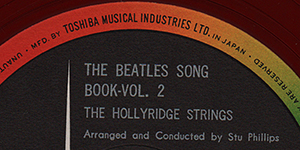 |
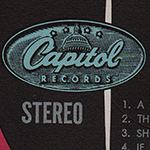 |
Capitol Black
label with color band. The words "MFD. BY TOSHIBA MUSICAL INDUSTRIES LTD. IN JAPAN" was printed at the perimeter. |
|||
| LABEL CLOSE UP |
|||||
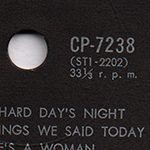 |
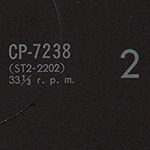 |
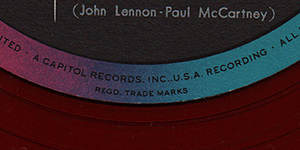 |
The words "A CAPITOL RECORDS, INC., U.S.A. RECORDING" was printed at the perimeter. | ||
|
OTHER ITEM
|
|||||
| - |
|||||
| RECORD LABEL | Capitol Black label with color band | ||||
| MIX | STEREO |
||||
| MATRIX No. | SIDE 1 | ST-1-2202- B2 #2 2 3(reverse) IAM mark (machine stamped) | |||
| SIDE 2 | ST2-2202- W1 2 3(reverse) IAM mark (machine stamped) | ||||
| PRESS MARK |
F5 |
||||
| VINYL COLOR | RED | ||||
| RECORD COMPANY'S NAME | SLEEVE |
Toshiba Ongaku
kogyo Kabusikigaisha |
|||
| LABEL |
MFD. BY TOSHIBA MUSICAL INDUSTRIES
LTD. IN JAPAN |
||||
| SYMBOL/PRICE | G ¥1,800 |
||||
| LYRIC SHEET STYLE | - |
||||
| COVER FORM | Gatefold type. Full laminated soft cover. flipback cover. |
||||
| INNER SLEEVE |
The original colour "advert" inner bag
Type-3 |
||||
| OBI | Light
blue Obi / without Order sheet |
||||
| COVER DESIGN/ PHOTO/ NOTES | Liner notes: Yoshiji Kizaki (*) | ||||
|
COMMENTS
|
Capitol Black label
with color band. The words "MFD. BY TOSHIBA MUSICAL INDUSTRIES LTD. IN JAPAN" was printed at the perimeter. The Hollyridge Strings were an in‐house act released by Capitol Records. Throughout the 1960's, they were perhaps best known for their instrumental versions of Beatles songs. The album was also reviewed in the June 6, 1964, issue of Billboard. This record surprised all critics by climbing to the #15 position in the Billboard album listings (August 22, 1964). As it continued to sell, the success of this album, the Strings' first, prompted Capitol to create a series of songbooks ‐‐ a series for which the band became known. This was Stu Phillips' first record and was the Strings' first attempt at instrumental rock and roll. The obi: "Light blue" Obi It is light blue / white in design with light blue background with the half circle on top. It also features an Odeon logo, catalogue number and price information. While most Japanese records feature local music, a lot of music fans there like foreign music, as well. The language barrier in Japan presented a problem – should foreign album covers be changed for Japanese albums? The solution was the obi, which means “belt” or “sash”. The obi is a strip of paper, usually about two inches wide, that wraps vertically around the album cover, containing information about the artist and album in Japanese. As these strips of paper were fragile and easily torn, they are often missing, especially since consumers in the 1950s and 1960s attached little significance to them. Finding Japanese records made prior to 1970 that still have the obi intact can be quite difficult, and for some albums, nearly impossible. The inclusion of the obi can dramatically affect the price of some Japanese records, sometimes increasing the price by a factor of ten. While usually found in a wraparound strip, there are other versions of the obi that have occasionally been used. In the early 1960s, a short-lived hankake obi, or “half obi” was used. These were small strips of paper that simply folded over the top of the cover. These were problematic for retailers, as they tended to easily fall off of the record. * Yoshiji Kizaki: Japanese music critic. A pioneer who contributed greatly to the popularization of Western music in Japan. Chief editor of Japanese 60s / 70s American pop music fanzines such as Teenbeat, Popsicle, etc. |
||||
